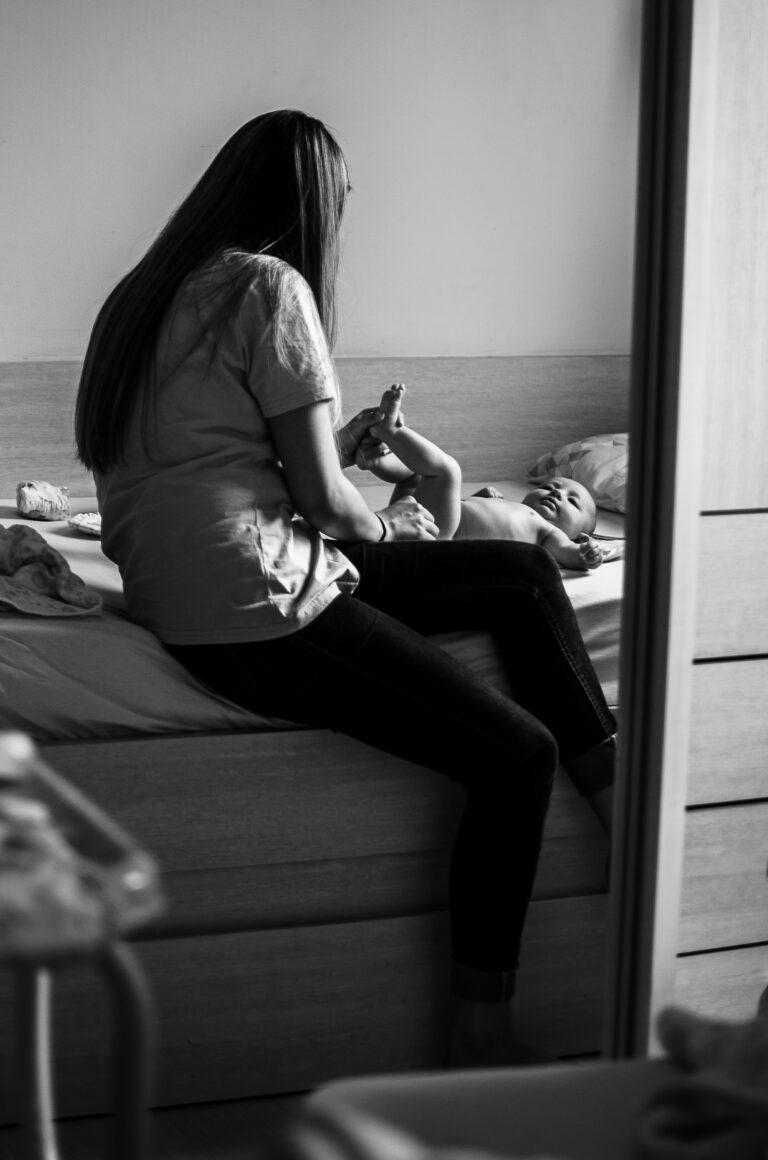Emerging from the dim corridors of midnight parenting, countless mothers find themselves awake again—straining to soothe, to calm, to understand. If you’ve ever felt like your energy is running out before the sun rises, or you’ve caught yourself wondering about the long-lasting “children’s sleep disorders impact on mothers”, you’re far from imagining things. The relentless cycle of interrupted nights and anxious days is more common than you may think—grappling with a child’s insomnia, frequent awakenings, or night terrors can turn the meaning of fatigue upside down. How does this strain ripple through maternal health, partner relationships, work life, and even the well-being of children themselves? With science on your side and practical strategies within reach, it’s possible to regain both perspective and hope.
Recognizing the Ripple Effect: When Children’s Sleep Disorders Shape Maternal Well-being
Children’s sleep problems—whether persistent bedtime battles, frequent night awakenings, or sudden outbursts in sleep—bend the arc of daily life for mothers. Approximately 25% to 40% of young children will struggle with sleep at some point, often peaking during infancy and toddlerhood, only to reappear during other developmental leaps. These are not isolated events; a child’s fragmented sleep can fracture parental routines, rewrite social calendars, and drain wellsprings of patience.
What emerges? Profound maternal exhaustion, a subtle reshaping of emotional resilience, and—bit by bit—the mother’s universe begins to contract: hobbies fade, socializing becomes rare, and even simple pleasures feel unreachable. The burden of nighttime caregiving often lands squarely on mothers’ shoulders. Is it any wonder that ongoing sleep disruption leads to increased irritability, reduced immune function, and that familiar eclipse of self-confidence? The “children’s sleep disorders impact on mothers” is anything but superficial.
Let’s pause: Have you noticed how a restless night amplifies every minor frustration the following day? Science points to disrupted sleep as a driver for heightened emotional reactivity, clouded judgment, and even postpartum depression. But the fingerprints of sleep deprivation go beyond emotional wellbeing. Cognitive effects—slow reaction time, forgetfulness, and difficulty focusing—slowly erode professional performance and diminish safety. It’s not “just tiredness”; it’s a physiological shift.
The Physiology of Infant Sleep and Maternal Fatigue
What exactly happens during those first months (or even years) when broken sleep becomes routine? Human infants are biologically wired for frequent night awakenings—an evolutionary legacy tied to feeding and protection. Western societies often practice co-sleeping, keeping infants nearby to enable responsive care and support breastfeeding. While this arrangement can make nighttime care more manageable for some, it can also compound fatigue, especially for mothers who are solely responsible for night feedings.
The unrelenting rhythm—up every few hours to feed, settle, or change—demands flexibility and adaptability. The mother’s circadian rhythm becomes misaligned, making true rest elusive. For breastfeeding mothers, the combination of sleep disruption and energy demands can even trigger a temporary decline in milk supply—a fact sometimes overlooked, yet solidly backed by research.
Contributing Factors: Beyond the Nightlight
Why do sleep disorders hit some families harder than others? The landscape is multi-layered—think of it as a network of influences, not a single cause.
Maternal Mental Health and Parenting Approaches
Maternal well-being, particularly underlying anxiety or depression, casts a long shadow over sleep quality for both mother and child. Heightened emotional sensitivity can disrupt consistent bedtime routines and lead mothers to respond urgently to every sound. Over time, this hyper-responsiveness—while rooted in care—can interfere with children developing their own self-soothing abilities. The children’s sleep disorders impact on mothers also expands to partners and extended family members, where a lack of understanding can create friction rather than reassurance.
Family Context and Environmental Stressors
Physical surroundings matter. Family stress, economic hardship, unstable housing, and routine disruptions all play roles in how sleep issues manifest and persist. Cultural values around co-sleeping or independent sleep, as well as differing opinions within couples, further influence nighttime care dynamics. Importantly, maternal social support (whether from a partner, friends, or community organizations) can act as a protective buffer—helping to distribute caregiving demands, dampen loneliness, and reinforce resilience. Isolation, by contrast, is a known risk factor for amplifying both sleep disturbances and emotional distress.
Genetics and Biological Sensitivity
Children are not blank slates when it comes to sleep. Up to 40% of childhood insomnia appears tied to hereditary patterns. Infants exposed to maternal stress or depression during pregnancy may also display altered stress response systems—making them more sensitive to environmental cues (noise, temperature, parental moods) and less able to return to sleep after disturbances. It’s a perfect storm for establishing difficult sleep-wake cycles.
Tangible Consequences: The Day-After Effects of Child Sleep Problems on Mothers
Physical and Emotional Exhaustion
What does ongoing sleep disruption do to mothers? The phrase “bone-deep fatigue” comes to mind—sleep debt accumulates, energy evaporates, and daily tasks can start to feel monumental. Irritability, sadness, and doubts about maternal competency become chronic companions, especially when rest feels unachievable. For some, this cycle spirals into postpartum depression, a condition where poor sleep is both a symptom and a potential trigger.
Family, Social, and Couple Dynamics
The “children’s sleep disorders impact on mothers” inevitably spills into relationships. Self-doubt and emotional weariness may foster tension between partners, particularly if responsibilities are unevenly distributed or misunderstood. Communication breakdown is common, and sexual intimacy frequently diminishes, with exhaustion stealing the space once reserved for connection.
Social isolation often follows. Friends fade into the background, invitations decline, and the once-solid links to community resources seem suddenly distant. Not to forget the toll on physical health—chronic tiredness can weaken immune response and convolute cognitive functioning, making every challenge feel steeper.
Professional and Economic Strain
Fatigue blunts professional ambition. Productivity wanes, mistakes multiply, and for some mothers, reducing work hours or stepping back from employment becomes the only way to cope. The indirect economic repercussions—lost income, costlier healthcare, less career progression—can press on families with surprising force, compounding stress and reducing outlets for support.
The Feedback Loop: How Maternal Well-being and Child Sleep Intertwine
The “children’s sleep disorders impact on mothers” moves in both directions. Anxiety or depression during pregnancy can affect a baby’s vulnerability to sleep disorders, through changes in cortisol regulation and the formation of stress pathways in developing brains. After birth, a mother’s mood stability and ability to create consistent routines shape how children learn to fall asleep independently. Conversely, each sleepless night raises the stakes—fatigue feeds distress, and distress impairs sleep for everyone involved. A supportive partner or co-parent can be a game-changer, but family discord can lock the cycle in place for longer.
Prevention and Management: Practical Measures for Parents
What actions break the cycle? Start with early recognition. Signs of persistent sleep disorders—difficulty falling asleep, frequent night terrors, sleepwalking, or bedwetting—warrant attention rather than endurance.
- Parental education demystifies normal childhood sleep trajectories and establishes realistic expectations.
- Structured routines help children predict what comes next; consistent responses at night reinforce boundaries and build security.
- Involving partners or alternative caregivers distributes the nighttime burden, especially for those breastfeeding.
- Spending time on rest—even a nap, even with a mountain of laundry left undone—is an investment in both maternal and child health.
Sometimes, using a transitional object (like a favorite blanket), employing gradual withdrawal methods for night wakings, or adjusting bedtimes can help children gain confidence in self-soothing. For mothers, prioritizing emotional check-ins (if only briefly), tapping into micro-communities (parent groups, forums), and engaging with community mental health resources extend critical layers of support.
When emotional exhaustion or persistent sadness won’t ease—when daily functioning is affected—it’s time to consult pediatricians, mental health professionals, or sleep consultants. Early intervention closes the door on many downstream difficulties and helps restore equilibrium.
Key Takeaways
- The children’s sleep disorders impact on mothers goes far beyond lost sleep—it shapes emotional, physical, social, and even economic health.
- Maternal fatigue isn’t trivial. It can subtly undermine breastfeeding, heighten self-doubt, trigger relationship tension, and affect parent-child attachment.
- Well-structured routines, strong support networks, and prompt professional engagement are powerful allies.
- Open communication—between partners, family members, and healthcare providers—lays the groundwork for resilience and solutions.
- Remember, extensive resources and healthcare professionals are available to support every family. For tailored advice, personalized support, and free child health questionnaires, download the Heloa app.
Pause, breathe, and take the next step forward—one gentle solution at a time.
Questions Parents Ask
How can I tell if my child’s sleep issue is affecting my own mental health?
Recognizing the impact of your child’s sleep difficulties on your own well-being is important. Signs can include feeling constantly on edge, experiencing sadness or mood swings, noticing less patience than usual, or struggling to focus during the day. Difficulties maintaining daily routines, feeling easily overwhelmed, or a drop in energy and motivation are also signals. If you sense these changes and they persist, consider reaching out for support—talking with your healthcare provider or a trusted professional can help you regain balance and peace of mind.
Are there ways to support my well-being while managing my child’s sleep disorder?
Absolutely, and it’s entirely normal to look for balance in this situation. Try to prioritize small moments for yourself, even if it’s just a few minutes of relaxation or breathing exercises during the day. Sharing nighttime duties with a partner or relative, when possible, can provide a welcome break. Connecting with other parents who understand similar challenges—through support groups or community meetings—often brings reassurance and helpful advice. Remember, seeking help is a sign of care for both yourself and your family.
When should I seek professional help for my child’s sleep and its impact on my family?
It is necessary to ask for support if your child’s sleep problems become ongoing and start to disrupt family routines, your mood, or your ability to function during the day. If you notice persistent feelings of sadness, anxiety, or exhaustion that do not improve with small changes at home, consulting your pediatrician or a sleep specialist can be very helpful. These professionals are there to guide you without judgment, offer tailored strategies, and help restore a sense of calm to your household.
Further reading:









